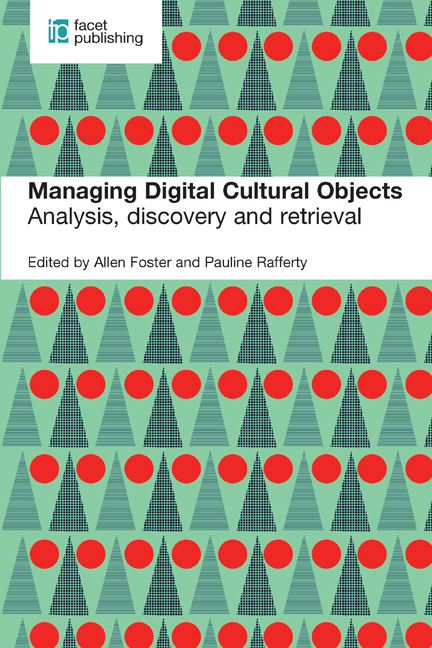Introduction
Published online by Cambridge University Press: 09 June 2018
Summary
This book explores the analysis and interpretation, discovery and retrieval of a variety of non-textual objects, including image, music and moving image. Its purpose is to inspire prospective students to develop creative and innovative research projects at Master's and PhD levels. This is an edited book that brings together chapters written by experts in the field. It provides an overview of the theoretical and academic aspects of digital cultural documentation and also includes contributions from practitioners within libraries and information organizations. Some of these contributions consider both technical and more strategic issues relating to cultural heritage projects, digital asset management and sustainability. The book covers a broad range of topics and draws from a number of disciplines, including information retrieval, library and information science, digital preservation and digital humanities, and even cultural theory, digital media studies and art history. We believe that this multidisciplinary and interdisciplinary approach is both necessary and useful in the age of the ubiquitous and mobile web.
The book is structured into three parts. Part 1 provides an introductory overview of general theoretical issues relating to the analysis of images, music and film, and the subsequent information retrieval design challenges. These chapters attempt to set the scene, introduce some innovative and novel approaches to digital indexing and search, explore metadata issues and consider social media as historical source. Alongside questions relating to subject access to information, semantic web and metadata in digital cultural docu - mentation, this section also considers relatively new approaches to retrieval including federated search and emotional indexing. There is still a gap in the field of information studies for theoretical scholar ship that focuses on the challenges and problems of interpretation of nontextual information. Derek Langridge's Subject Analysis (1989) remains the classic in LIS, and Rafferty and Hidderley's Indexing Multimedia and Creative Works (2005) includes some discussion of such issues, but we believe that it is timely to update that discussion within the theoretical section of the current book.
- Type
- Chapter
- Information
- Managing Digital Cultural ObjectsAnalysis, discovery and retrieval, pp. xvii - xxPublisher: FacetPrint publication year: 2016



